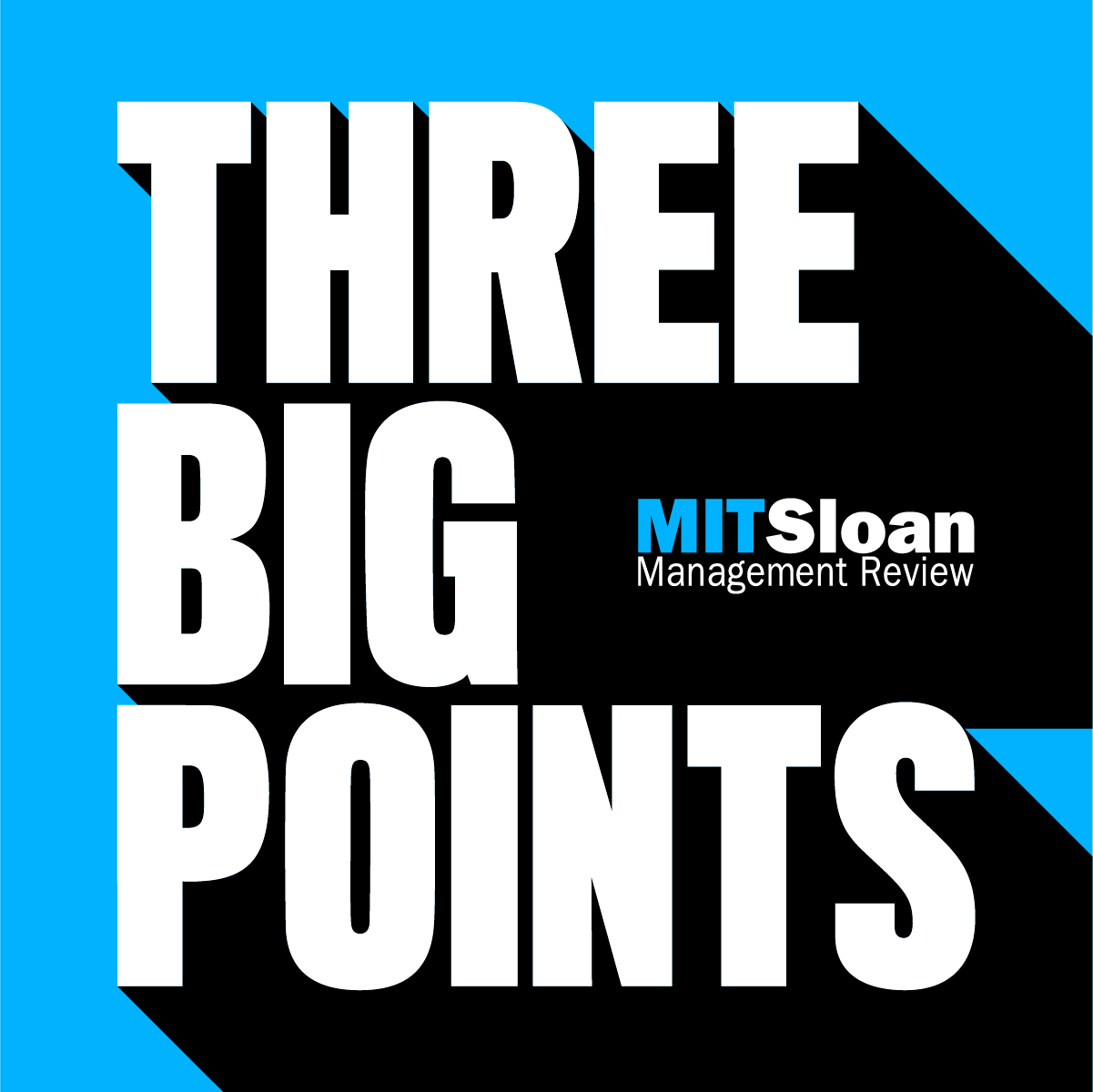“If you are going to be naked, you’d better be buff.” So says MIT SMR columnist Andrew Winston in this week’s episode of Three Big Points, as he echoed one of his favorite quotes about organizational life in the age of transparency.
Winston’s point is a critical one: In our data-rich world, a company’s stakeholders — its customers, partners, suppliers, investors — know more than ever about the organizations with which they do business. At the same time, they possess unprecedented power to spread the word about anything that goes wrong or that displeases them.
The so-what for leaders? Get. It. Together. If you don’t (and maybe even if you do), something will go wrong. And when it does, the damage to your business and your reputation will be revealed more quickly and spread faster and wider than ever before.
Alas, this lesson remains largely unlearned in business. In spite of the countless scandals and corporate black eyes — banks exposed for charging customers for services they never agreed to; live video of passengers being pulled from airline seats they rightfully purchased; privacy breach after privacy breach — most companies still have not embraced what it takes to operate in the perilous new landscape of data, transparency, and social connectivity.
In this week’s Three Big Points, Andrew Winston unveils these key lessons:
- Get your act together. If you’re doing something you don’t want the world to know about, you’ve got a problem. People are going to find out.
- Listen to all of your stakeholders. What do they care about, and what do they want to know about how you operate?
- Know your story and be prepared to tell it. Why do you exist? What is the value your business provides to the world? Being clear on your mission and your raison d’être is an asset in good times as well as when you hit a bump in the road.
Subscribe to Three Big Points on Apple Podcasts, Spotify, or Google Podcasts via the Subscribe dropdown menu above.
For Further Reading
Transcript:
Andrew Winston: There’s just this reality that everyone in the world is carrying a video camera.
There’s clear demand for putting money into funds that have some impact. I mean, to me that is basically a clean label movement.
If we’re gonna be naked, we better be buff. And what that means is if we’re going to walk around with everything showing about our business, then we got to get our act together, especially on environmental and social performance.
Paul Michelman: I’m Paul Michelman, and this is MIT Sloan Management Review’s Three Big Points. Each episode, we take on one topic that leaders need to be on top of right now and leave you with three key takeaways for you and your organization.
You see a statistic almost every day about how much more data the world has amassed this year than last or the last 10 years combined before that. Thanks to the data revolution, we know more than ever about what’s happening in our world and why — and that kind of knowledge can be a beautiful thing. But it can also be a very risky thing for business leaders. As customers, investors, regulators, and assorted other stakeholders gain new insights into how businesses operate, they grow hungry to learn ever more about what actually goes into the products and services they consume. The world’s expectations have been reset. We now expect access to information. We expect transparency. And companies are being held accountable for the decisions they make like never before in history.
When things are going well and businesses are acting responsibly, transparency can be a great asset. When things go wrong, transparency amplifies our problems; even explodes them. And when you combine the kind of access to knowledge about our organizations that the average person has with the power they possess to spread that knowledge instantly across the globe, you have a risk management scenario few leaders could have imagined even as recently as a decade ago.
Andrew Winston: The expectations of really everybody around a company — your consumers, your big business customers, communities, even your investors — the expectations are rising in just access and openness to information about the company, about everything it does, about every product and service, and the ability to answer tons of questions about how you operate as a business. And we’re seeing that pressure, especially from younger generations, the millennials, the Gen Z, who are growing up connected and sharing in a way that is truly unusual and is changing the nature of how we communicate as humans and what we expect of each other.
Paul Michelman: That’s Andrew Winston, author of The Big Pivot and founder of Winston Eco-Strategies. He’s a regular contributor to MIT Sloan Management Review. Winston says that part of what’s driving this change in expectations are mega concerns like climate change and the impact companies have on the environment as well as our current socioeconomic climate. But it’s the exponential increase in data and the ability to share it that has really opened people’s eyes.
Andrew Winston: This kind of communication comes from this increase in ability to collect data — real time and much shorter order. But there’s also this massive data collection going on about companies in the world through social media. You know, there’s plenty of companies that are very good at collecting the mood around a company, what’s being said. And if something goes wrong in the community, there’s someone out there catching it.
Paul Michelman: So, this onslaught of data and the ability to spread it in the blink of a tweet is a double-edged sword. On the one side, there’s a powerful opportunity to please customers in new ways. Take the hospitality industry.
Andrew Winston: I have a large client who’s in the hospitality space, and they serve enormous corporate customers that buy thousands of rooms a year for all their employees. And they are providing, increasingly, information — on, in particular, environmental and social impacts. So they’ll give them a climate footprint of all their stay. They’ll provide a carbon footprint, a water footprint, even a footprint on their spend in their supply chain on diverse suppliers. So they’re telling their big customers: Hey, you buy about 1% of our rooms, we spend $1 billion on diverse suppliers in our supplier program, so you get about $10 million of that — that’s allocated, in a way, to your own goal.
Paul Michelman: The increasing demand and expectation for information about how companies do business is also contributing to what Winston calls the “clean label movement.” We increasingly expect to know at a detailed level what we’re putting in and on our bodies. Some of the fastest growing consumer products today have a clear sustainability story as part of their brand. And this drive toward transparency is not just in consumer products. It has huge implications across a range of industries.
Andrew Winston: I’m seeing it also even in the financial world. Anecdotally, my business has shifted quite a bit in the companies I work with and the companies that ask me to come speak about these issues to a great deal of work in the banks and in the financial world. There’s a very clear increase in different categories they call different things — it could be called impact investing or sustainable investing or ESG investing (which is environmental, social, and governance). There’s clear demand for putting money into funds that have some impact. I mean, to me that is basically a clean label movement.
Paul Michelman: Of course, we can’t talk about data and transparency without also talking about the tech industry, which is both enabling all of this data collection and also one of the industries suffering most from consumer backlash against what’s being done with that data.
Andrew Winston: Think about the risk to the brands in technology right now, the big four or five that run our digital lives, and Facebook in particular — Russian bots and Russian strategy kind of taking over the dialogue around an election in the U.S., and the memes that go around [and] how difficult it is for Facebook and Twitter to try to control that. There’s an irony here that technology allows an amplification that is to the level now of not just — there was an oil spill and it hit one region. This is now affecting democracy and can reach millions and millions of people with bad information — something that creates fear or sows dissent. And I don’t think we have any good answers to this. But we’re finding it out, right? It’s all gonna be in the open. And if we can get smarter as consumers, maybe we can get better about having our own kind of screens on our brains. But it’s very difficult.
Paul Michelman: Winston says that despite recent scandals everywhere from Wells Fargo to Boeing, companies still are often not prepared with either offensive or defensive strategies.
Andrew Winston: Even if it’s not as big as “Hey, there’s something wrong with our entire line of our planes,” say, that something can go wrong in a particular facility or store or operation — that can now go global. And this viral thing is not made up. So there’s just this reality that everyone in the world is carrying a video camera. So over the last few years, we’ve seen things like: On United, a gentleman gets escorted off a plane because they’d overbooked, and he gets basically dragged off a plane. It gets filmed. It’s seen by almost everyone. I was in China a couple of weeks later, and I asked how many people saw this? Every hand went up — I think it was seen 100 million times within a day.
Paul Michelman: So how are companies to cope with this explosive mix of data and social connectivity? Well, it begins by embracing the idea that things can go wrong and recognizing that the cost of your mistakes is far greater than ever — because you can’t stop the world from knowing about it. But that’s a hard and often very expensive lesson to learn.
Andrew Winston: Look, we’re reactive in life. And there’s been a challenge in risk management forever, which is, what’s the value of not having that problem hit your brand? It’s really hard to measure, right? So you don’t get a lot of credit for the things that don’t happen wrong. It’s always a very difficult thing to build into your business. You know, like a giant oil spill in the Gulf — when there’s a burst oil well, which is then fixed by building kind of a second well to dig in, but that takes weeks and weeks and weeks. Well, you could avoid that by building the second well to begin with, but that’s expensive, right? There’s all these really hard choices. And companies, I think, are not great at it. And they don’t want to spend money up front until they know there’s a problem. By the time you know it, it’s a little late.
Paul Michelman: That’s MIT Sloan Management Review columnist Andrew Winston, whose most recent book is The Big Pivot: Radically Practical Strategies for a Hotter, Scarcer, and More Open World.
And the three big points you need to remember about transparency:
No. 1: Get your act together. If you’re doing something you don’t want the world to know about, you’re in deep trouble.
Andrew Winston: This is one of my favorite quotes that a lot of people have used, which is: “If we’re gonna be naked, we better be buff.” And what that means is if we’re going to walk around with everything showing about our business, then we got to get our act together, especially on environmental and social performance.
Paul Michelman: No. 2: Listen to all your stakeholders — about what they care about and what they want to know.
Andrew Winston: The expectations of really everybody around a company — your consumers, your big business customers, communities, even your investors — the expectations are rising in just access and openness to information about the company.
Paul Michelman: No. 3: Know your story and be prepared to tell it.
Andrew Winston: This kind of vague area of purpose in business: What’s your product for? Why do you exist? What do you do for the world? If you can’t answer those things, transparency is going to kill you.
Paul Michelman: Three Big Points is produced by Mary Dooe. Music by Matt Reed. Marketing and audience development by Desiree Barry. Our coordinating producer is Mackenzie Wise. Special thanks to Deborah Gallagher, Lauren Rosano, Jennifer Martin, Richard Marx, Michael Barrette, Jinette Ramos, and Karina van Berkum for all they do to make this show possible.





